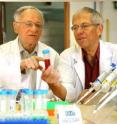Synthetic molecules hold promise for new family of anti-cancer drugs
Synthetic molecules designed by two Hebrew University of Jerusalem researchers have succeeded in reducing and even eliminating the growth of human malignant tissues in mice, while having no toxic effects on normal tissue. For their work in developing these harbingers of a possible new generation of anti-cancer drugs, Dr. Arie Dagan and Prof. Shimon Gatt of the Department of Biochemistry of the Hebrew University-Hadassah Medical School were among those receiving the Kaye Award for Innovation today during the 71st meeting of the Hebrew University of Jerusalem Board of Governors.
The molecules developed by Dagan and Gatt affected the metabolism of various sphingolipids and consequently those of cancer cells. Sphingolipids are a family of complex lipid molecules that are involved in signaling pathways that mediate cell growth, differentiation and death.
Several of the most active molecules developed by Dagan and Gatt are derivatives of ceramide (a member of the sphingolipid family). Ceramide induces programmed cell death (apoptosis) in a variety of cancer cells.
The natural levels of ceramide in cancer cells are generally too low to induce a therapeutic effect. In preclinical studies to date, various treatments with the synthetic molecules resulted in an elevation of ceramide levels in cancer cells, thereby leading to their death by apoptosis. In addition, these synthetic molecules appear to be synergistic with chemotherapeutic drugs.
Dagan and Gatt state that their studies demonstrated that their synthetic compounds reduced considerably the sizes of pancreatic, prostate and breast tumors with little or no effects on normal cells and tissues. The researchers see this as a precursor to the development of a new generation of anti-cancer drugs that induce, selectively, apoptosis only to tumorous cells. These drugs are expected to be highly effective while inducing fewer side effects than current anti-cancer drugs.
Source: The Hebrew University of Jerusalem
Other sources
- Synthetic molecules hold promise for new family of anti-cancer drugsfrom Biology News NetWed, 4 Jun 2008, 21:35:27 UTC
- Synthetic Molecules Hold Promise For New Family Of Anti-cancer Drugsfrom Science DailyWed, 4 Jun 2008, 19:21:18 UTC
- Synthetic molecules hold promise for new family of anti-cancer drugsfrom PhysorgWed, 4 Jun 2008, 14:49:17 UTC
